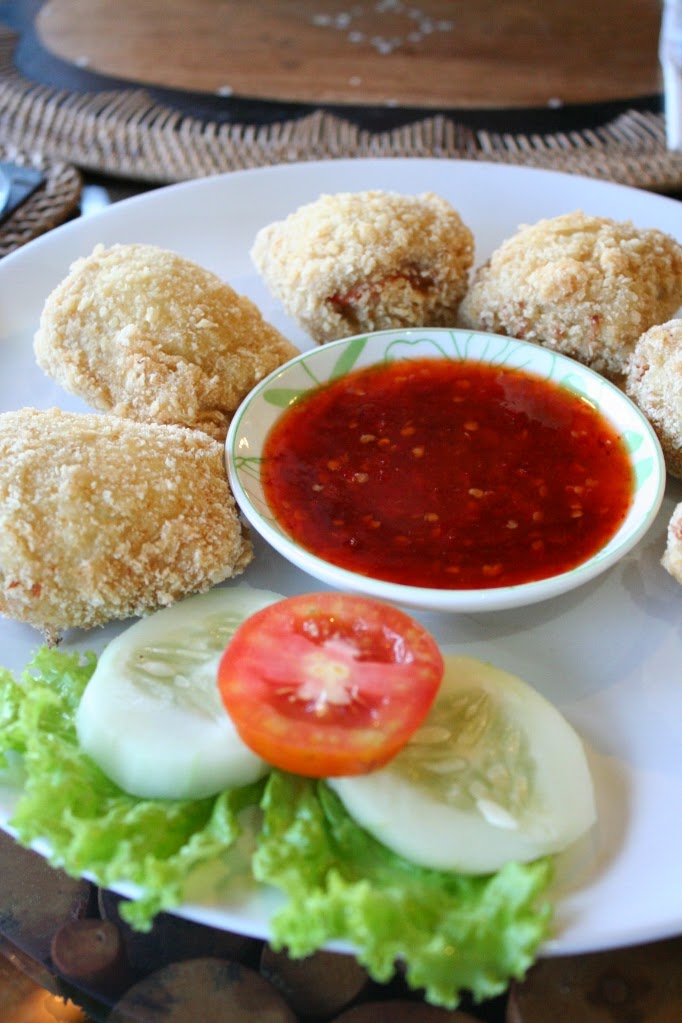 |
| Pisang rai and teh jahe |
Another local specialty is pisang rai. Pisang (bananas) get into just about everything sweet - if not, it's usually coconut. Pisang rai is dish of rice flour dumplings stuffed with banana and covered in fresh coconut and palm sugar. In this case, the dumplings were coloured green with pandan. Sweet, chewy little morsels for breakfast went well with the tea.
After breakfast, the owner of the homestay took us down to the plantation behind his home. Being at the top of a hill, the garden lies on a slope, which has been terraced like the land used to grow rice. The land has been in the family since his grandfather.
The upper terraces closest to the house are full of vegetables that need regular tending, such as cucumbers, chillies, garlic, onions, cassava, sweet potato, as well as fruits, such as papaya, avocado, and pineapple, not to mention a collection of orchids. Many of the plants are still young and will take another five years to bear fruit. However, the owner showed us a 40-year-old clove tree that he remembers his father planting, and a young tree that will mature in his own son's lifetime.
Beyond the fruit and vegetable-laden upper terraces, it's pretty much coffee and cloves - typical crops for this area - all the way down. The coffee is robusta, as it grows smaller than the Balinese coffee plant, and so is easier to harvest.
 |
| Na |
The owner harvested a ripe avocado and papaya, knocking the latter from the tree with a stick. The fruit was quite a size and landed with a thud. He prepared both fruits for us and we enjoy the papaya with a squeeze of lime and the avocado as an unadulterated juice. There's no fresher taste than straight from the garden.
 |
| Avocado juice and papaya |
Our walk today took us out of Munduk and towards the next village of Gesing. Although not far (about 5km), the route wound its way up and down the hilly landscape, affording us occasional glimpses over the fertile rice terraces.
 |
| Rice terraces at Gesing |
It wasn't until we reached what we assumed was the village centre that we stopped at a café, persuading the owner to open up, and enjoyed a panoramic view over the green steps thick with crops.
We returned home the quicker way, carving a path directly through the valley and up the steep hill alongside the irrigation system of the rice terrace, drawing some odd looks from workers in the fields.
We rewarded ourselves with dinner at Aditya - a homestay and warung close by that offers an uninterrupted view over the same rolling hills as we had been clambering through earlier today.
 |
| Tahu isi |
Tahu isi were an appetiser of breaded tofu pockets stuffed full of vegetables and served with a sweet chilli dip.
 |
| Kare tahu tempe |
To follow, I chose kare tahu tempe - a curry that was strong with dried spices and crammed with vegetables, soft pieces of fried tofu and meaty cubes of tempeh. K selected tahu saos teriyaki - tofu in a sweet, rich teriyaki sauce, which was an unusual menu item for an otherwise Indonesian selection.
 |
| Banana caramel ice cream |
We both finished with sweet caramelised banana slices and ice cream. In many other places, I could imagine the view would command a high price or, worse, the food and service would be an afterthought to the natural aspect. Happily, the staff were super friendly, the food inventive and delicious, and the bill the same or less than any other warung.
No comments:
Post a Comment